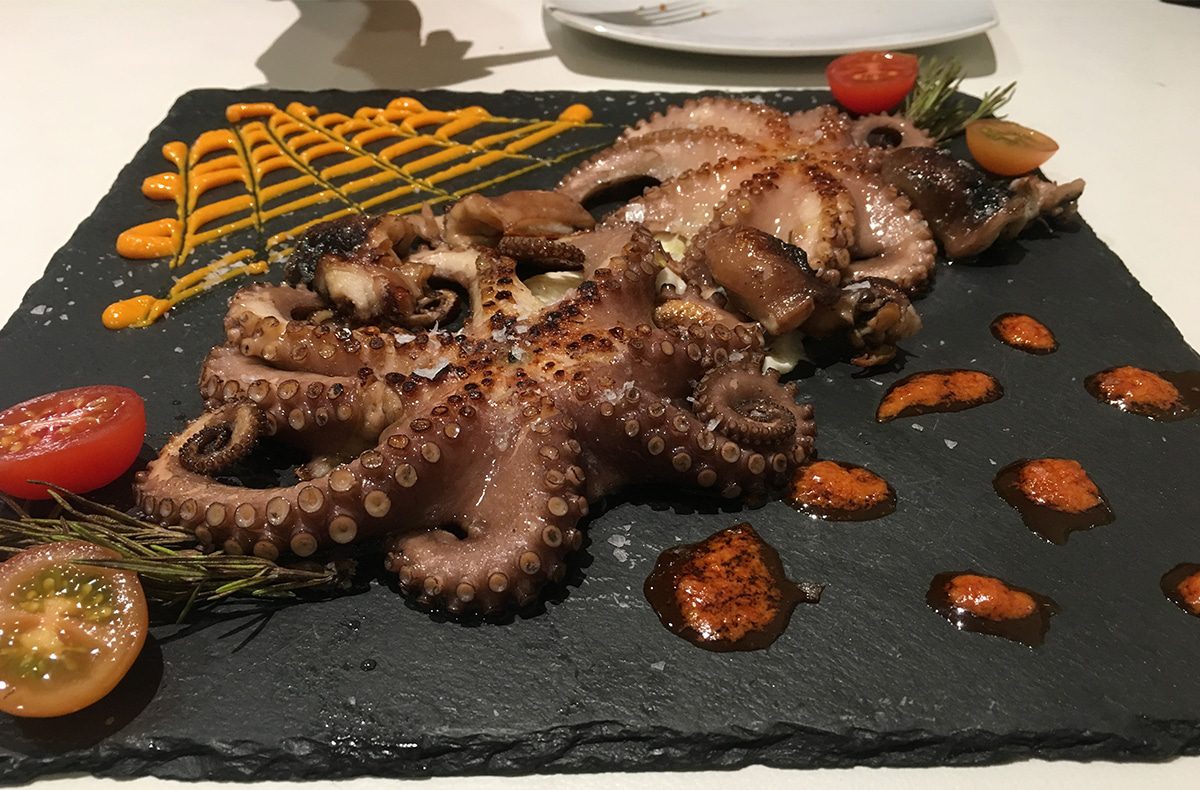
La gente canta con ardor
“Que viva España”
La vida tiene otro sabor
¡Y España es la mejor!
If you ever find yourself on the terrace of a Spanish tapas restaurant, it’s quite unlikely you’ll hear these lyrics. Chances are better you’ll be blasted by an anonymous reggaeton jam or the latest Taylor Swift hit. However, should you happen to sit down at a place playing “Que Viva España,” you’d probably congratulate yourself on finding a hidden gem. Smiling at the waiter, you’d order a frosty jar of sangría and marvel at your luck. In this tourist-plagued paraíso you’ve somehow stumbled upon The Authentic Spain.
That’s hard to do these days. For decades, Spain has been one of the most popular travel destinations in the world. From the beaches of Costa Brava to bull-runnings of Pamplona, the country caters to the tastes of all travelers. And speaking of such, all these sunburned foreigners have to eat.
Spain may be a Western European country, but nothing sets it apart from its neighbors as much as lunchtime. The midday meal and the pleasant malaise that follows it might be Spain’s most famous cultural export.
To paraphrase the late great author Douglas Adams, when you’re tired of taking a little siesta you’re tired of life.
You, dear reader—yes, you, of the above-average educational achievements and the enviable income bracket—may have experienced the wonders of an outdoors Spanish lunch for yourself. When done well, the experience is as close to heaven as you can get with your pants on. When done poorly, it’s still much better than most meals you eat at home.
Either way it changes you. Or it should at least.
It starts with the setting, as everything always does. The hunt for the perfect terraza has beguiled countless travelers. Ideally you’d find a tree-shaded square away from motorized traffic. A ring of cute wrought-iron tables beneath colorful parasols would fan out from a storefront emblazoned with the name of an ambiguously Iberian family who’ve run the place since 1885 or whatever. Maybe a street guitarist would be playing nearby, engrossed by their music and completely disinterested in collecting tips after each song. You’d check the menu, find it satisfactory, and take your pick of tables amongst a sea of attractive couples.
(In reality you tend to settle for anywhere with a semi-shaded place to sit and a still-open kitchen, as most places stop serving food around 4pm.)
Then it’s time to order the drinks. You might opt for a tinto de verano if the aforementioned sangría feels a bit too basic for a sophisticated jetsetter like you (they’re essentially the same thing, but who cares). Or maybe a clara, the beer-lemonade cocktail that’s indistinguishable from a shandy on a molecular level yet in a completely different universe from a taste perspective. You could order regular water, or agua con gas. You’re in Spain, why not live a little?
As you wait for the waiter to return with your beverages, you examine your food options. The patatas bravas, a slightly more exotic and cubic French fry, are an obvious choice. From there it gets trickier.
Stay safe and opt for the plates of queso and jamón ibérico, taking refuge in the familiar comforts of ham and cheese? Venture further afield with some croquetas (breaded rolls stuffed with bechamel and other delights) and pinchos (slices of baguette topped with sausages and/or whatever catches the cook’s fancy)? Dive beneath the sea with calamares a la andaluza (fried squid rings) or boquerones (anchovies in vinegar)? Go the vegetarian route and stick with pimientos de padrón (roasted little peppers with oil and salt) and berenjenas fritas con miel (sliced eggplant fried and drizzled with honey)? Or shake your head at all the above and pick the Instagrammable splendor of the paella?
Friend, I must tell you from the bottom of my heart—I don’t give a shit what you choose. But as you enjoy your Spanish lunch on the terrace, I hope some of these thoughts will cross your mind:
That quintessential Spanish song quoted at the beginning of this article is not actually Spanish. “Que Viva España” isn’t even its original title (that would be “Eviva España,” which is a nonsense phrase). The song was first written and performed by Belgians in the early 1970s, as a romanticized ode to the sun-and-sex drenched vacation destination.
Nobody cared that Spain at the time was suffering under the Christofascist dictatorship of Francisco Franco, whose decades-long reign of terror—backed by the Vatican, the United States, the United Kingdom, and other “democracies”—left hundreds of thousands dead and millions more scarred for life.
Likewise, few travelers enchanted by the charms of contemporary Spain realize that the country has been reduced to a tourism-dependent servant economy with massive youth unemployment and widespread economic devastation that is wiping entire towns off the map. The bottle of wine that’s five times cheaper in Barcelona than Bristol or Boston isn’t so affordable because of some mysterious Spanish castle magic—it’s because the guy serving it to you is getting paid next to nothing.
Even the siesta itself is increasingly out of reach for most Spanish workers. They toil for longer hours than their famously industrious German counterparts, though they’re more likely to be way overqualified for their jobs. For many young Spanish people, it doesn’t matter how educated or hardworking they are—there are just no other options aside from bussing tables or guiding sweaty foreigners from early medieval church to late medieval castle.
This state of affairs hasn’t come about because Spaniards are lazier or stupider than their Northern European brethren. It’s an inescapable fact of capitalism: for you to enjoy a languid, bargain-priced feast in the shadow of a cathedral, someone else has to suffer.
Does that mean you shouldn’t do it? You’re an adult, and you’ll make your own decisions. But whatever you decide on, please be honest about what it entails.



